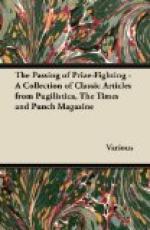* * * * *
Miss MILLS YOUNG tells us that John Musgrave, the middle-aged hero of Coelebs (LANE), “was not a prig, but he came perilously near to being one at times.” Well, if anyone ought to know, it is his creator, so I will accept her word for it, though for myself I should have called him a first-class prig. The little village in which he lived his bachelor existence was invaded by some up-to-date people who took the Hall, and proceeded to liven up things. Mrs. Chadwick freely shocked the poor man; she smoked, was a reckless conversationalist and had modern ideas, all which disturbed the decorous manner of his life. Moreover, she had taken upon herself the heavy task of finding him a wife, and John’s phlegmatic heart began to flutter when he saw Peggy, her lady-gardener and niece, standing on a ladder, in blue trousers. He was incensed by such apparel, but he was also intrigued. From that moment his number, as they say, was up. Apart from a dog-incident, which is far too prolonged, and some rather cheap sarcasm at the expense of a wretched spinster, this tale of John’s conversion from something drier than dust to a human being is neatly told. All the same I prefer Miss YOUNG’S South African stories.
* * * * *
My conjecture about The Magic Gate (HUTCHINSON) is that its author, MAUD STEPNEY RAWSON, found herself with two stories to choose from, one of the Gate itself, and another of the romance of Lydia and John Wodrush. In my opinion she chose the wrong one. The history of the Wodrush elopement, compressed to a couple of pages, seems to me far more original and interesting than the present rather unwieldy




